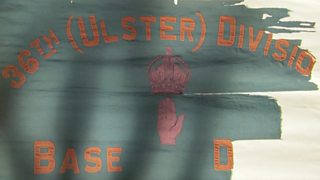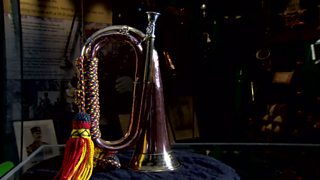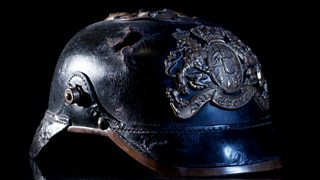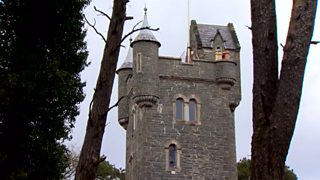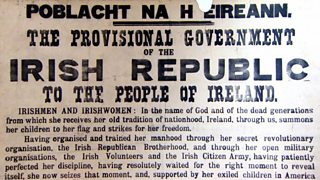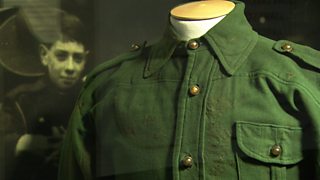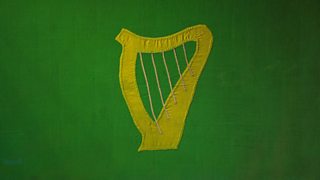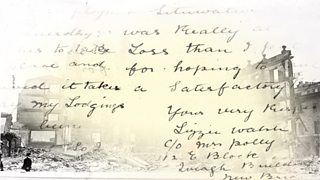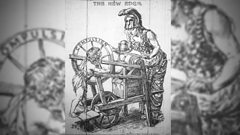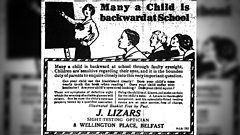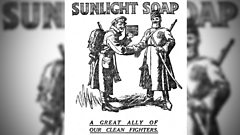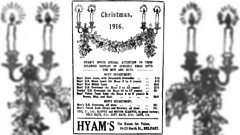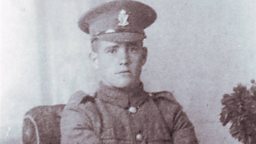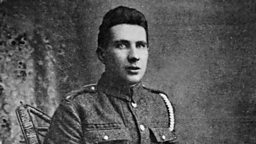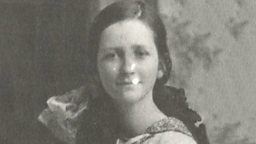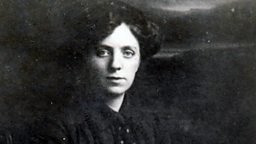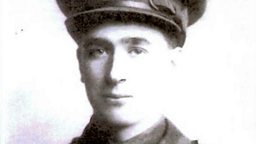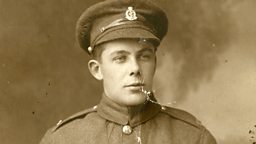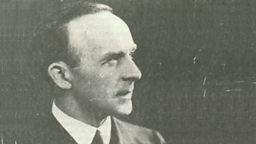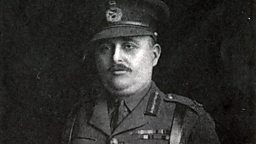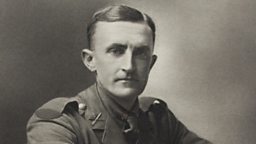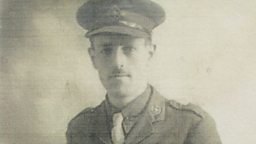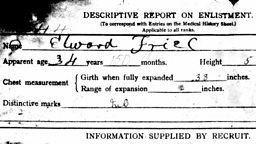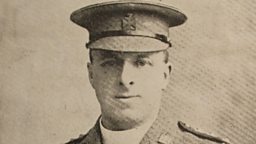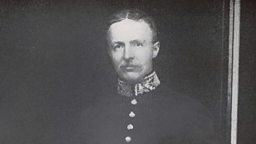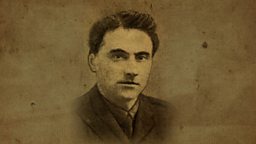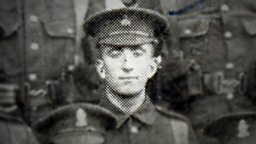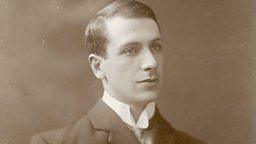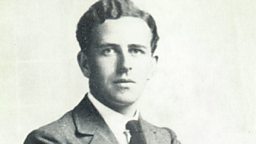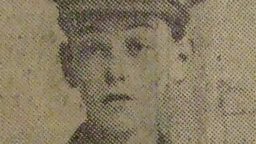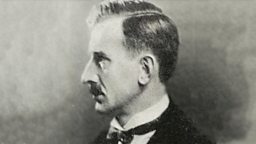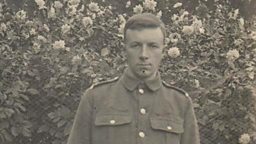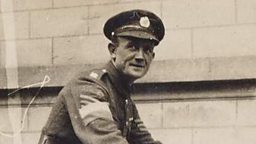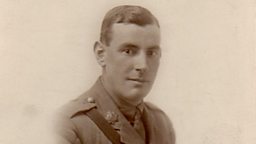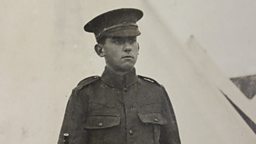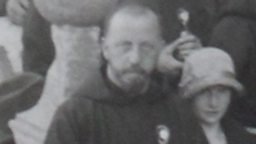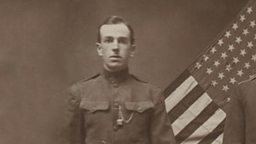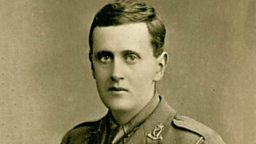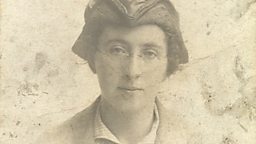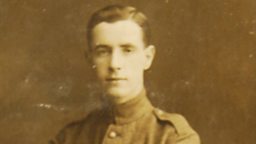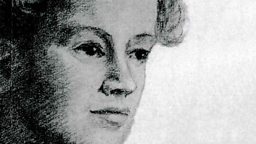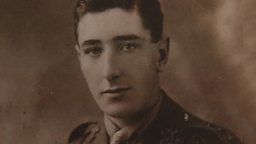John M Regan
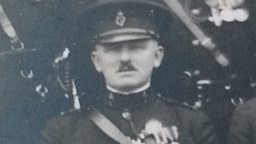
Irish officer at Rising & Somme
Born in Belfast to a Catholic family, who subsequently move to Monaghan, John M Regan was a Royal Irish Constabulary policeman at the time World War One was declared. Volunteering for the British Army, he was an officer with the Royal Irish Rifles at Dublin's Portobello Barracks when the Easter Rising broke out.
The outbreak of war changed everything
Regan's memoirs describe his involvement in events across the week and at the heart of the Dublin city. These range from clearing looters in Grafton Street to coming under sniper fire, from being part of the advance guard of the column going to surround the GPO to witnessing the surrender of James Connolly.
Thereafter, Regan recorded that he was sent to Belfast's Victoria Barracks, but not for long. Very soon after the Rising, Regan found himself arriving in France as an officer in the 36th (Ulster) Division.
Background
John Regan was born in Belfast in 1889 to a Catholic family living at near the centre of the city.
His father had joined the Royal Irish Constabulary (RIC) and on his promotion to District Inspector at Carrickmackross, the family moved to County Monaghan.
After leaving school, Regan initially became a schoolmaster in England: "I was the eldest son of a large family and knew I had to make my own way in the world ... I wanted to be independent."
Following various teaching positions, Regan prepared for a Cadetship exam for the Royal Irish Constabulary. He was successful and says that in 1908, he "reported at the RIC Depot in Phoenix Park [Dublin]."
RIC appointments
After training, Regan's first appointment was to Tulla, County Clare, as District Inspector third class, where he stayed from 1909 until 1914. He then transferred to Lisnaskea in County Fermanagh from 1914-1915.
He recalls: "Apart from a very occasional danger of party trouble, Fermanagh was very free from crime ..." In the north of Ireland however, Regan says the "sectarian question" would arise, and "there was always the danger of disturbance on the occasions of processions and demonstrations with consequent criticism of police ..."
Nonetheless, "the freedom of the district from crime" meant Regan had "plenty of time for recreation", and he recalls being "very happy in the district save for a cloud on the horizon which was getting darker and seemed to presage a thunderstorm."
Regan says the Ulster Volunteers "continued to perfect the organisation and training of their members" and "appeared to be in deadly earnest", while their political opponents "either did not, or pretended they did not, believe it, casting ridicule on their drilling with wooden guns, and suggesting that the particular form of armament was symbolical of the ineffectiveness of the movement generally. Knowing North of Ireland men I could not relieve my anxiety by accepting that view ..."
To him, as a policeman, he says: "The rights and wrongs of the arming of the Volunteers will provide a subject for argument for many a day, but these had nothing to do with me as a police officer. I was paid to enforce the law against any person who infringed it, whether in the North or South, and was prepared to comply promptly with any orders received from higher authority in connection with the Volunteers, being confident that my men would act similarly."
Arms had been landed
Regan recalls that, "like a bolt from the blue, the Volunteers received a ship load of arms and ammunition on the occasion known as the Ulster gun-running."
Regan says he believes that "it was perhaps fortunate for us that the gun-running took the Government by surprise, or, if it did not, that they issued no orders to deal with the emergency, as if plans had been made to deal with it and were in possession of the concerned in the distribution of the weapons the consequences might well have been very serious for us."
He questions: "The gun-running at Larne was, or was it not, the beginning of the arming of the Irish people which resulted in the Irish Volunteers, the Irish Republican Army, the fight with England, the establishment of the Irish Free State and the beginning of the dismemberment of the British Empire? Did it influence the Germans in deciding on whether to start the First World War? One person's guess appears as good as another."
In his own district, Regan says, "I received information that arms had been landed." He discovered they were en-route to a house in his district, "... but considering the matter much too serious to be dealt with by a junior officer like myself, waited during the afternoon for a reply to my request for directions as to action."
He says that none arrived, and he went to sit opposite the front gate of the house, "... till the cars appeared, each with bundles on the back seats, and swung in to the avenue. There was quite a number of them and I recognised some of the drivers ..."
Regan reflected: "It would not have been difficult for a comparatively small body of police to have seized the weapons, but to prevent them from being retaken when the Volunteers of the area had been summoned might have been a very different matter ..."
He then, he says, "... returned to my headquarters expecting to get orders on the following morning but none came and there the matter rested. ... It was fortunate for me that there was no conflict with the Volunteers, as a number of my friends were members of the organisation and to have had to take action against them would have been the most unpleasant duty of my career."
After the gun-running, Regan says, "... that there was considerable tension was undoubted, as I remember clearly having a feeling of relief when war was declared in that if there was fighting to be done it would be against foreigners and not against my own countrymen."
Volunteering for war
Regan says: "The outbreak of war changed everything, and politics receded into the background, reappearing only when each party tried to make capital out of the matter of recruits for the army its followers provided."
Of himself, he recalls, "as soon as war was declared I decided to volunteer for the army but some personal matters obliged me to delay my application for a couple of months ..."
With Regan's request thereby arriving later than others, and the RIC only sparing a certain number of officers to go, he is refused permission, which he finds "... very irritating, as I had been promised a company in a newly formed battalion of the Connaught Rangers (a regiment for which I had always a tender spot), and now that chance was gone I decided to make the best of it."
In his area, Regan says he regularly finds both the 36th (Ulster) Division and the 16th (Irish) Division recruiting. He found recruiting for the former was "very brisk", while "the best speaker by far that I heard in my district was Tom Kettle, although I will say I did not hear any other members of Parliament speak. He had a persuasive style ... His 'Are you coming, boys?' at the end of his speech always appealed to me. I spent a few pleasant evenings with him. ..."
He and others fundraise for comforts for local men at the Front, but, says Regan, "I felt that many people thought I should be in Khaki, and at one recruiting meeting a soldier in the audience made no secret of his opinion on the matter ... it was rough on me owning to the way I was situated."
Regan says it was "well into 1915 when I was informed by my authorities that if I still cared to volunteer, I would be seconded to the army." But "I may say that the first flush of enthusiasm had fled."
He had heard, he says, from a soldier friend in France "that war had ceased to be any fun", but nonetheless agrees he will "go if they fixed me up, as the job I could have got myself was now gone." Soon, he says, he finds himself "in the 6th Royal Irish Rifles, attached to the 3rd Battalion at Portobello Barracks, Dublin ... I never joined the 6th Battalion."
Irish Volunteers' strength
With the 3rd RIR, Regan says, he was "posted as second in command of a company commanded by Captain Bowen-Colthurst ..." Regan describes the Captain as "a first class soldier", but says he had "a personality more suitable, perhaps for an army commander than for a captain ..." He recalls of Bowen-Colthurst that "he was definitely not normal ..." Regan himself says he felt "exceedingly sorry for him in the serious trouble which he afterward got into during the rebellion", and that, "... I thought the awful act committed by him in shooting prisoners without trial showed in itself his state of mind at the time."
Regan was rapidly promoted by Captain Bowen-Colthurst, he says, and given command of D-Company.
During his service at Portobello Barracks, Regan recalls that "the Irish Volunteers seemed to our eyes to be growing in strength. Time and again companies of men in green uniform and with rifles and bayonets were to be seen marching in the streets of Dublin. We did not know what to make of it all."
Things then, he says, "with the Irish Volunteers seemed gradually to get worse. We started to lose rifles in the battalion in a most mysterious way ... it was obvious that there was some clever traitor amongst us whom we never suspected ..."
Easter week 1916
Rumours rise
On Easter Sunday, Regan says, he was in charge of their picket of four officers and a hundred men, when he received an “order to stand to and issue ammunition … Sometime after 10pm we got orders to ‘stand down’. I never learned the reasons for the order …” He reflects, “It seemed strange that this should have happened on the eve of the Rebellion as everybody seemed taken so much by surprise when it broke out the following day.”
Next morning, Easter Monday, 24 April 1916, Regan handed over charge of the picket, and headed off to the Fairyhouse races with colleagues. En route, “we saw a body of armed men in green uniform approaching … We thought that the party of Volunteers were on one of their usual route marches and as they waved to us we waved to them and went on our way …”
Then they passed Stephen's Green, Regan noticed "there were great signs of activity, green uniformed figures being at the gates and all over the place. We said, 'The Volunteers are having a big field day today'. They were."
"During the day at the races we heard rumours of trouble in Dublin, but did not quite believe it. Before the end of the races we knew that something was up but had no idea of its nature or magnitude. We started for home."
Nearing the city, they are advised to make for Dublin Castle, and helped as "women and girls got on the footboard of the car and guided us through the back streets." Coming under fire, they have to "run the gauntlet, but none of us was hit", and they eventually reach the Castle.
Attempts on City Hall
Regan says he was "placed in charge of the troops or rather individuals from all sorts of units, who had taken sanctuary in the Castle. They had arms wherever they came from." City Hall beside the Dublin Castle having been captured by the rebels, "we were to try to take it." But two parties had already failed, he says, and a third was to make the attempt: "If they failed, it was my turn."
Describing the experience of waiting, he says: "Machine-guns firing from under the archway at the gate were making a most dreadful noise ... I did not know the lie of the land, nor indeed where the building to be attacked was actually situated."
Then, when he is "feeling anything but comfortable", those ahead of him go out: "luckily, the party before us captured their objective."
Action around the city
Next, Regan says, he was directed to get a party to occupy a public house, of strategic importance, and subsequently to join a column at Trinity College Dublin, for which he's ordered to "get a party of four officers and a hundred men."
In the process, Regan says, among the officers he "decided to ask for volunteers ... none was forthcoming", and he and an officer friend, who had not yet resumed duty after being wounded in France, turned out.
Take no prisoners
Getting to Trinity College, and supported by Royal Dublin Fusiliers, Regan says he was ordered to take his company and clear looters in Grafton Street: "We were to take no prisoners."
They found, he recalls, a grocery and wine merchant's shop with people inside. Firing a shot at the roof, he says two men bolted: "Somehow I could not fire at them, although I suppose they deserved it. There was a dreadful hub-bub inside ..." Women, Regan recalls, appeared with "aprons full of everything from jam pots to wine bottles", and he says, "we had to put a stop to looting so I determined to scare the wits out of them."
Regan continues, "I ordered them to be marched to Trinity College informing them that we would shoot them there." Near Trinity College, he says, "we halted and I told them that their time had come ... the commander of the company of the Dublin Fusiliers came over to me and begged me not to shoot them, so I must have looked in deadly earnest. I told him to have sense. I then said to them that I did not want to shoot them in cold blood and would give them a sporting chance."
Regan says he told the women "... that on the word 'go' they were to make off and when I counted ten we would open fire. The word 'go' went and so did they. At ten we fired a few shots in the air to make it more realistic and that was the last I saw of them. I hope we cured them of looting."
Surrounding the GPO
After this, says Regan, "the serious business was now to begin, and my company was to be the advance guard of the column going out to surround the GPO."
Going to Dublin Castle, he recalls they then had to cross a bridge, which was under fire, to reach the far side of the river. Concerned about doing this in daylight, Regan is relieved when "the gate of the Castle opened and in came a large dray, with a boiler fitted on it – an improvised armoured car. This was indeed a godsend."
Putting six men inside, he says, he got in himself "with a sledgehammer", and they crossed the bridge. Then, intending to occupy houses, they reached the first. Regan says he knocked in the door, and the men took up position in the house. Thereafter, "we occupied houses, one after the other, in this manner without a casualty ... the person who thought of improvising this armoured car deserved to be well rewarded."
Then, recalls Regan, holding "command of the different streets covered by the occupied houses", things are relatively quiet, with mainly sniping action, until the troops from England arrived.
Regan found these arrivals "had had a gruelling time coming into Dublin and did not know friend from foe. They regarded, not unreasonably, everyone they saw as an enemy, and fired at anything that moved. My men objected to this, and I had some trouble at first in keeping the peace, but after a little the newcomers settled down and all was well."
Snipers
During Easter Week, Regan says, "people were of course not allowed to move about the streets and very soon there was a grave shortage of food, particularly bread. I was very sympathetic with all the housewives ... people like them had assisted my friends and me to reach Dublin Castle."
So, he recollects, "I formed them up in fours, with their baskets, and marched them to the bakers shop and back again, so relieving the situation."
But snipers, he says, were a constant issue, and at a window, "a bullet struck the wall inside the room within a few feet from me." Others followed, and Regan discovered they had "been fired by some English Tommies from behind a chimney stack on Jervis Street hospital ..." Determined to prevent further firing, and "training a machine-gun on the chimney stack we gave it a few bursts of fire." After that, he says, they "left us severely alone."
Witnesses Connolly's surrender
Regan says: "I was present in Moore Street when a man was brought out on a stretcher to surrender. It was James Connolly. There was another man in green uniform who surrendered about the same time. I thought the English officer to whom he gave himself up was very patient with all the conditions that were being talked about."
Later, Regan describes hearing the captured prisoners from the GPO pass his headquarters "at a late hour", saying: "There is something weird in the sound of marching at the dead of night and as the prisoners were singing 'God Save Ireland' I seemed to hear the words, 'What matter if for Erin's cause we fall', sung in deadly earnest for the first time. I was greatly impressed in spite of my antipathy towards them owing to the loss of some of my men."
After the Rising
Return to Belfast
A few days after the end of the Rising, Regan says he "returned to Portobello Barracks and was only a day or two there when I was ordered to charge of the advance party to take over Victoria Barracks, Belfast, whither the battalion had been transferred. I had never taken over a barracks before ..."
Regan does so, but recalls his time in Belfast was short: "I had not been very long in Belfast when I received my orders for France." He departed in mid-May, 1916.
To France, to fight
Regan arrived in France "just six weeks before the battle of the Somme" and was tasked with raining scouts and patrolling in 'no man's land' in front of Thiepval.
36th (Ulster) Division
His posting was with the 36th (Ulster) Division - to Regan "an entirely Protestant division".
He attributed this posting to a lack of awareness among senior command. "Whatever staff officer was responsible for the posting should have been given some post where a knowledge of the world was not required."
The Somme
Battle begins
"The battle of the Somme came. I was with my scouts waiting for the breakthrough till we would go on in front but, in spite of the wonderful progress made by the battalion, the lack of support, coupled with enormous casualties, forced it back to the original line.
"It was a tragedy and the losses were staggering. We were pulled out of the line to reform the battalion and go up to the Flanders front."
Fish out of water
"How a Roman Catholic could be expected to give his best in an atmosphere which must necessarily be less than friendly, if not hostile, completely passes my understanding.
"It was unfair to both parties ... I knew quite well they did not want me and I did not want them. I got a job at battalion headquarters to give me something to do while (as I understood) they tried to get rid of me and very definitely I tried to get away from them."
Regan was desperate for a transfer, but was instead "made a permanent fixture with the division, which nearly broke my heart. I felt like a fish out of water."
Tactful 'Twelfth'
A pleasant surprise was to greet Regan during the 36th Ulster Division's 12 July celebrations on the front. The men refused to sing any Orange so as not to offend him.
"I thought it must have been almost unique to have a Twelfth of July concert without an Orange song."
This despite the company being "a particularly Orange one [with] a lodge of its own, or so I understood. The men were from the shipyards in Belfast, a locality in which the Pope is still held in small regard."
After the Somme
Illness interupts
Regan left the front in France on 15 August 1917 after contracting influenza and, after convalescing, was taken back to England on 7 September.
He was discharged from active service one month later.
Out to Africa
On 7 January 1918, Regan was once more declared fully fit for service. He was posted to Africa with the King’s African Rifles, where "many a time wished I was back again in France with the Ulster Division, where there was such a much better morale."
Regan was finally discharged from army duty on 24 April 1919.
Return to the RIC
Upon the end of his armed service, Regan rejoined the RIC. He rose rapidly through the ranks to County Inspector of Limerick in October 1920 and served throughout the War of Independence (1919-21).
"I, myself, was very glad of the Truce. I had had, I think forty-five men killed and a large number wounded. The IRA so far as I could guess had about the same number of casualties.
"I hated war and killing, but it was forced upon us, and we had to fight for our lives and for those of our comrades. I often thought the same end would have been reached if a shot had never been fired by the IRA."
RUC and retirement
After the partition of Ireland, Regan moved north to join the newly formed Royal Ulster Constabulary (RUC). He was put in charge of County Tyrone on the new Irish border in June 1922, moving to take charge of County Down a decade later.
He eventually resigned from the RUC in 1948, at the age of 59, and received an OBE upon his official retirement.
John Regan died on 26 August 1971.
These pages are based on personal testimonies and contemporaneous accounts. They reflect how people saw things at that time and are not meant to be a definitive history of the period.
Voices 16 objects
Voices 16 galleries
Credits
John M Regan's memoirs are held at the , and were published as The Memoirs of John M. Regan (ed. Joost Augusteijn) by in 2007.
Extracts and biographical information are given here by permission of PRONI, Four Courts Press and Joost Augusteijn. Photograph by permission of the .
